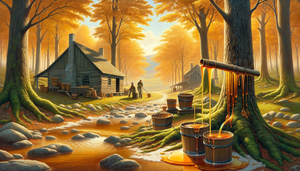Cultural Significance of Maple Syrup
Jul 23, 2024
Maple syrup is more than just a sweetener; it's a symbol of tradition, sustainability, and Vermont's natural bounty. For maple syrup lovers, foodies, and breakfast aficionados, understanding the cultural significance of this golden delight offers a deeper appreciation of its role in Vermont’s heritage.
The Roots of Maple Syrup in Vermont
Historical Background
Maple syrup production in Vermont dates back to indigenous peoples who first discovered the process of tapping maple trees and boiling the sap to create syrup. This method was passed down through generations, becoming integral to Vermont's agricultural practices.
Evolution Over Time
Over the centuries, the techniques for producing maple syrup have evolved from simple wooden taps to modern tubing systems and evaporators. Despite technological advancements, the essence of the process remains rooted in tradition.
The Cultural Identity of Vermont and Maple Syrup
Symbol of Sustainability
Maple syrup production is a sustainable practice that aligns with Vermont’s commitment to environmental stewardship. Tapping maple trees does not harm them; the industry supports local economies while preserving the landscape.
Community and Tradition
Maple syrup season, known as "sugaring season," is a community gathering and celebration time. Families and neighbors come together to collect sap and boil it into syrup, fostering a sense of camaraderie and shared heritage.
The Artisanal Quality of Vermont Maple Syrup
The Process
- Tapping: Small holes are drilled into maple trees, and taps are inserted to collect the sap.
- Collecting: Sap flows into buckets or tubing systems, then transported to sugarhouses.
- Boiling: The sap is boiled down in evaporators until it reaches the perfect syrup consistency.
- Filtering and Bottling: The syrup is filtered to remove impurities and then bottled for sale.
Unique Flavor Profile
Vermont maple syrup is renowned for its rich, complex flavor, which results from the state’s unique climate and soil conditions. The taste can vary from light and delicate to dark and robust, depending on the time of the season and the specific maple trees tapped.
Health Benefits and Culinary Uses
Nutritional Value
Maple syrup is a natural sweetener that contains essential minerals like manganese, zinc, and potassium. It also has antioxidants that contribute to overall health.
Versatility in the Kitchen
Maple syrup is a versatile ingredient used in:
- Breakfast dishes: Pancakes, waffles, oatmeal
- Baking: Cookies, cakes, breads
- Savory dishes: Glazes for meats, vegetables, and salad dressings
- Beverages: Coffee sweeteners, cocktails
The Economic Impact
Supporting Local Farmers
The maple syrup industry is vital to Vermont’s economy, providing income for local farmers and creating jobs. Small-scale producers often use traditional methods, ensuring high-quality products and preserving Vermont’s agricultural heritage.
Global Recognition
Vermont is the largest producer of maple syrup in the United States, and its products are sought after worldwide. The state’s commitment to quality and tradition makes Vermont maple syrup a premium choice for consumers.
FAQs
Q: When is the best time to visit Vermont for maple syrup season? A: Vermont's prime sugaring season is late February to early April.
Q: How much sap does it take to make one gallon of maple syrup? A: It takes approximately 40 gallons of sap to produce one gallon of maple syrup.
Q: Can maple syrup production harm the trees? A: No, tapping maple trees does not harm them when done properly.
Q: What are the different grades of maple syrup? A: Maple syrup is graded by color and flavor, ranging from Golden Delicate to Very Dark Strong.
Q: How should I store maple syrup? A: Maple syrup should be stored in a cool, dark place. Once opened, it should be refrigerated.
Maple syrup is a cherished symbol of Vermont’s cultural identity and heritage. Its production fosters community, supports sustainable practices, and provides a versatile, healthful ingredient for kitchens worldwide. By understanding the cultural significance of maple syrup, we can appreciate its sweetness and the rich traditions and values it represents.


